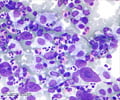Greater attention to palliative care for children with cancer is needed to prevent them from suffering unresolved symptoms at the end of life.
Greater attention to palliative care for children with cancer is needed to prevent them from suffering unresolved symptoms at the end of life, according to the authors of a study published in the Medical Journal of Australia.
Clinical Associate Prof John Heath, from the Children’s Cancer Centre at the Royal Children’s Hospital, Melbourne, and his co-authors conducted a study of parents of children who died of cancer between 1996 and 2004. Parents from 96 families were interviewed at an average of 4.5 years after a child’s death, with 89 parents subsequently returning self-report questionnaires.Eighty-four per cent of parents reported that their child had suffered “a lot” or “a great deal” from at least one symptom in their last month of life – most commonly pain (46%), fatigue (43%) and poor appetite (30%).
However, current treatments for these symptoms appeared inadequate, Prof Heath said, with success rates of under 50% for all symptoms and under 20% for symptoms such as fatigue, poor appetite, constipation and diarrhoea.
Prof Heath said a striking difference between the study and previously published international studies was the low proportion of patients who died in hospital (39%) and, more specifically, intensive care units (9%) compared with those who died at home (61%).
Another key finding was the lower level of aggressive, cancer-directed treatment during the end-of-life period (47%) compared with the level (56%) previously reported in a similar cohort in the US.
“Relatively high rates of death at home and low rates of heroic medical interventions suggest a realistic approach to care of children with cancer at the end of life. However, many Australian children who die of cancer suffer from unresolved symptoms,” Prof Heath said.
Advertisement
“Given the positive impact that specialist paediatric palliative care services have had overseas, it is hoped their recent introduction in Victoria will improve symptom control and lessen suffering for children dying of cancer,” Prof Heath said.
Advertisement
The statements or opinions that are expressed in the MJA reflect the views of the authors and do not represent the official policy of the AMA unless that is so stated.
Source-AMA
SRM














